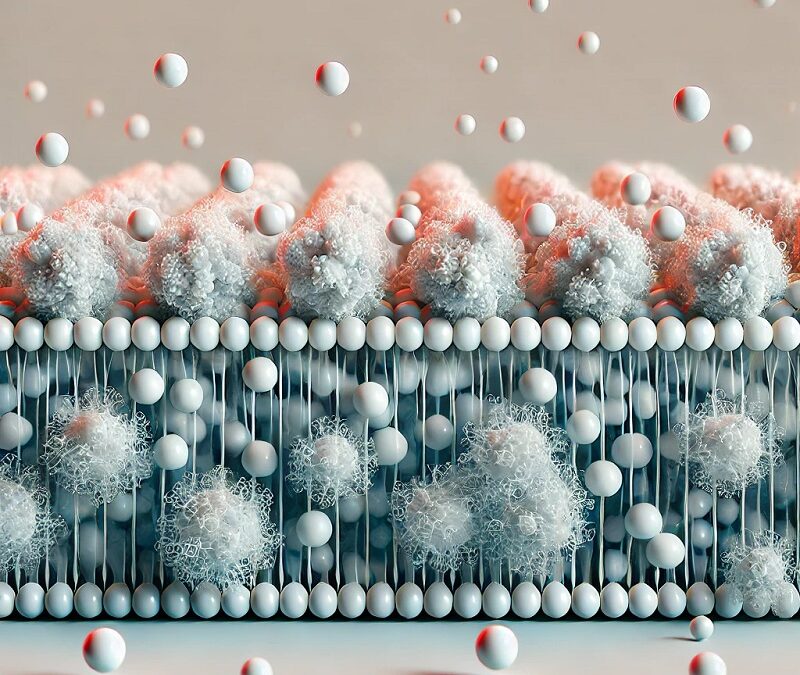Newcastle University researchers have reported developing a new ambient-energy-driven membrane that can pump carbon dioxide out of the air.
A First – Like A ‘Water Wheel On A Flour Mill’
As Dr Greg A. Mutch (Royal Academy of Engineering Fellow in the School of Engineering, Newcastle University) explains, his team has demonstrated “the first synthetic membrane capable of capturing carbon dioxide from air and increasing its concentration without a traditional energy input like heat or pressure”.
Dr Mutch has likened the membrane’s ambient-energy power source to a “water wheel on a flour mill” because “whereas a mill uses the downhill transport of water to drive milling, we use it to pump carbon dioxide out of the air.”
How & Why?
The membrane was developed as part of tackling the challenges posed by the separation process in ‘direct air capture’, a technology that removes carbon dioxide directly from the atmosphere using chemical processes. With carbon dioxide being the main contributor to climate change (we release ~40 billion tons into the atmosphere every year), it’s hoped that alongside transitioning to renewable energy and traditional carbon capture from point sources like power plants, direct air capture can be used to help reduce atmospheric carbon dioxide levels. This could help mitigate climate change and help meet climate targets, e.g., the 1.5 °C goal set by the Paris Agreement.
Challenges
The Newcastle University researchers (along with colleagues from 5 other universities) set out to tackle two challenges in the dilute separation processes of direct air capture. These were:
1. Due to the low concentration, the kinetics (speed) of chemical reactions targeting the removal of the dilute component are very slow.
2. Concentrating the dilute component requires a lot of energy.
The newly developed membrane meets both challenges because it doesn’t need traditional energy input like heat or pressure to operate (it just uses the energy from a humidity difference), and technologies such as X-ray micro-computed tomography and molecular scale modelling created a membrane where reaction could happen quickly. Another key aspect of the membrane’s performance is that it has ‘carriers’ within it that uniquely transport both carbon dioxide and water but nothing else.
The Importance of Separation Process Like Direct Air Capture
With direct air capture being cited as one of the “seven chemical separations to change the world” (David S. Sholl & Ryan P. Lively – Nature.com), improving the process with a new membrane should be seen as an important step forward.
In fact, as highlighted by Newcastle University, “separation processes underpin most aspects of modern life” e.g., most food, fuels, and medicines have been through separation processes and in a world moving towards a circular economy, separation processes will become even more critical. For example, “direct air capture might be used to provide carbon dioxide as a feedstock for making many of the hydrocarbon products we use today, but in a carbon-neutral, or even carbon-negative, cycle”.
What Does This Mean For Your Organisation?
The development of this new ambient-energy-driven membrane, led by Newcastle University researchers, could mark a significant breakthrough in the field of sustainability, particularly in carbon capture technology. For businesses, this advancement could have profound implications across multiple dimensions. For example, companies that are striving to meet sustainability targets and reduce their carbon footprint could benefit greatly from incorporating this new technology. Traditional carbon capture methods are often energy-intensive and costly, presenting barriers to widespread adoption. However, the membrane’s ability to function without conventional energy inputs like heat or pressure makes it a cost-effective and environmentally friendly option. This can help businesses achieve their climate goals more efficiently and at a lower cost.
Also, industries heavily reliant on hydrocarbon products now have a promising pathway to transition towards a circular economy. The membrane’s capacity to capture and concentrate carbon dioxide from the air means that CO2 can be used as a feedstock for manufacturing various products. This not only aids in reducing atmospheric CO2 levels but also provides a sustainable source of raw materials, thereby fostering innovation in product development and reducing dependence on fossil fuels.
The membrane’s utilisation of ambient energy also aligns with the growing trend of leveraging renewable energy sources. Businesses could integrate this technology with existing renewable energy infrastructures, such as solar or wind, to further enhance their sustainability initiatives. This synergy may be able to amplify the impact of their environmental efforts, contributing to a more sustainable future.
The membrane innovation could also open up new opportunities for investment and collaboration. Companies in the tech and industrial sectors may want to partner with research institutions like Newcastle University to further refine and commercialise this technology. Such collaborations could lead to the development of customised solutions tailored to specific industrial needs, driving growth, and fostering a competitive edge in the market.
This groundbreaking membrane technology, therefore, not only addresses critical environmental challenges but also offers a myriad of business advantages. From cost savings and new product innovations to enhanced sustainability and collaborative opportunities, businesses may stand to gain significantly by adopting this cutting-edge solution (or others like it). As we move towards a greener economy, staying ahead of such technological advancements will be crucial for long-term success and sustainability.

